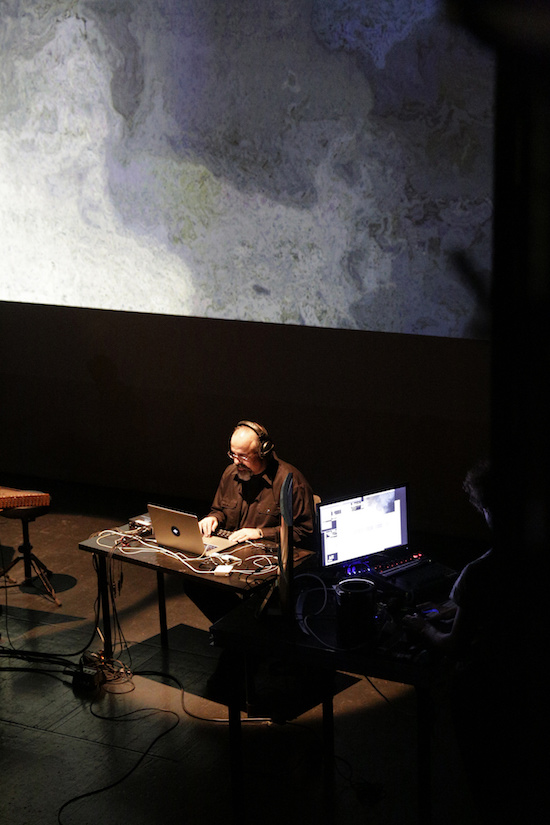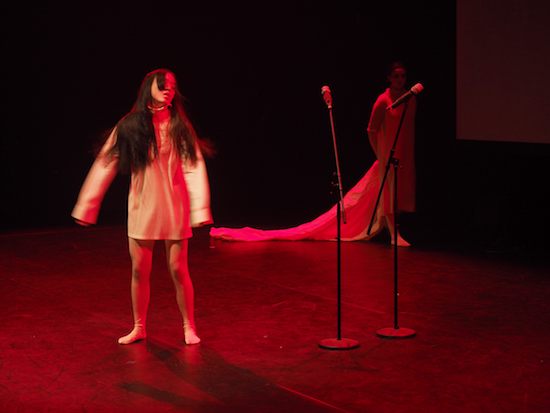Context, as ever, is everything.
In another time you’d get another reaction; at another point in history a forward-thinking festival promoting progressive and largely experimental music – one taking place in Berlin of all places – that bills itself as a space for “adventurous music and art” might draw a sarcastic eye roll from even the least cynical among us. One that takes, as its theme for the year, the totemic ideas of Fear, of Anger, and of Love would certainly be pushing its luck – or, at the very least, find itself subject to a run of high quality Donnie Darko memes on Twitter. Yet these are exactly the circumstances of CTM 2017: these are the parameters within which the festival takes place and this is exactly the platform upon which this specific edition of the event will take place, and yet somehow these ideas have never seemed more important, more prescient, or more vital than they do right now. Context, as ever, is everything.
Just over a week before I leave London for Berlin, freshly-inaugurated (or, to use the post-Brexit lexical field: “newly-emboldened”) president of the United States Donald Trump passes an executive order suspending the country’s refugee program, placing an indefinite ban on refugees from Syria and a near-blanket ban on entry for anyone arriving from seven spuriously chosen Muslim-majority nations. On the face of it, this may seem far removed from a progressive arts festival taking place over six-and-a-half-thousand kilometres away from Washington but, in reality, the implications are tangible and the events are – as ever – profoundly interconnected.
Firstly, consider the action itself – born out of fear and supported, against all reasonable evidence, by a powerful – albeit naively-orchestrated – anger; consider too the response – both on the ground, at airports and in the streets of major (and not so major) cities across the United States, and their parallels in other countries on a global scale. While, regretfully, it may be a handsome fallacy that “Love Trumps Hate,” particularly when the hate in question commands such ugly power, nonetheless it proves itself time and time again to be at least its equal. These outpourings, too – of a toxic political venom and its anti-venom – go some way to proving something else: that Fear, Anger, and Love are far from abstract concepts. They may be simplified avatars of more complex ideas, but they are not benign – as powerful totems they excerpt a very real presence on the world and, necessarily, on all of us at different levels every single day.
Consider, too, what it means that, before any of this even happens, the quiet hands that book CTM Festival throughout the year until its culmination in January and February – a complex shadow puppet theatre taking place entirely in the dark until, as the final act, the lights are switched on and the entire cast is revealed – chose this theme above all other possibilities. And, of course, consider what it means that with this in mind they chose to showcase artists from Iran producing exceptional music; work that not only counters stereotypical tropes about Middle Eastern culture through its experimentation but which doesn’t need to trade in or trade on its cultural heritage to be heard or to be affecting.
It’s true, to paraphrase Richard Kelly, that you can’t just lump everything into these three categories and then just deny everything else, but it’s also true that they provide a platform on which to build more complex discussion and a springboard for moving forward. This is where CTM excels above other festivals: not because it sidelines traditional festival hedonism in favour of discourse but because, over time and perhaps ultimately crystalised in this year’s edition, it has found the empathetic balance between the two.
There are undoubtedly thousands of images of a weather-beaten Sean Bean announcing that “One does not simply walk in to Berghain,” and for the most part that remains very much true. That being said, it isn’t in any way disappointing to find – on a Tuesday night when the air temperature is below zero and the pavements aren’t so much glazed with ice as half-heartedly buried alive beneath it – that the experience of queuing at Berghain is tempered somewhat. And, although it isn’t the first night of the festival per se, it is both a baptism by fire and a perfect introduction for those of us who have only just arrived.
Over the course of a decade of music as Pharmakon, there is perhaps no other artist on this year’s program who so obviously taps into its theme as Margaret Chardiet. Where ambient music is so often (and so often wrongly) written off as background noise, noise itself – like any fringe, experimental art form tugging at and expanding the edges of its own definition – is often held in similar contempt by sonic traditionalists. Perhaps much of this stems from a misnomer: that noise lacks empathy – that it exists in abstract for its own sake as pure experimentation – but, if anything, Pharmakon’s relatively short set this evening is testament to the opposite and proof that there is no irony whatsoever in titling her most recent album Contact.
There is a trope in music in music writing to describe the kind of sounds that Pharmakon plays as “pummeling,” or “assault,” or in other terms that denote a certain kind of violence. This isn’t entirely wrong, but it suggests a purely external force – something vicious and malignant – and misses completely the sense in which this is music looking to make a connection; that this is something which has, in desperate frustration, broken out in search of something. Yes, it can be overwhelming – the depth of bass and the hiss that permeates it are a powerful force – but its power is in its raw attempt at making contact rather than its propensity for wreaking havoc. The engulfing quality of the short set that Pharmakon plays is both transcendent and imminent: it provides an escape from the body which acts as a kind of Jungian grand unifier for everyone in the room, but also forces those same people to become acutely aware of their own body and the presence of the others around them. It’s a lesson in pure empathy distilled from something that could so easily, in other circumstances, conjure the opposite.
It’s an effect replicated later in the week by the Chinese producer Pan Daijing with an arresting performance piece that mixes the darkest depths of a near-asphyxiating brand of techno with a presence that – over the course of the set – moves from abstraction to a kind of pure presence, taking polaroids of the seated audience inches from their faces. As a work it manages to walk the line between invasion and invitation, giving as much as it takes – a cathartic process that ends, back to the room, with a walk into throbbing visuals that calls to mind the “One Last Midnight” speech from True Detective or an hour spent in the onyx vortexes of the Rothko Chapel: nothing that is taken is lost, only collected and preserved somewhere not yet accessible. It serves as a reminder, too, that the lines between fear, anger and love are not clear cut, or perhaps even distinct at all, but constantly draw parallels with one another and exist in a state of constant flux.
Moor Mother, too, delivers a coruscating set which rises to meet and ultimately seems the absolute apotheosis of the year’s theme. The Quietus described last year’s Fetish Bones as a “sharp, and understandably sarcastic Black American take on the Ulysses template,” and similarly in its poetic it calls to mind a more potently anguished version of Claudia Rankine’s Citizen: it’s difficult, in that sense, to imagine a more apt personification of the Fear, Anger, Love triumvirate in the current political and social climate than the music Moor Mother creates or the way in which she interacts with her audience – a turbulent and righteously irate one-way dialogue stream of consciousness that pushes her own experience to the foreground and effectively challenges anyone in the room to ask what it might mean to foist their own interpretation on top of that and what kind of cultural erasure that might constitute.

Putting aside the political implications of not only hosting but pointedly showcasing three contemporary Iranian artists, 9T Antiope, Siavash Amini and Sote’s presence at CTM is one defined by nuance and experimentation rather than by controversy – these are three acts whose sounds, while cohesive in the sense of their progressiveness, are individually distinct.
9T Antiope’s fusing of classical strings and vocals with sounds distinctly of the present moment come together to create a unique and sprawling dream pop; Amini’s ambient swells and expansive soundscapes, which have both rightly and tritely earned him the moniker of the “Iranian Brian Eno,” are siren-like in their allure and challenging in their depth and complexity; Sote’s use of traditional Persian instrumentation with his trademark deep-bass-throb electronics and accents are an astounding maze of sonic connections. In their individual qualities and their circumstantial unification here at CTM, they prove to be a necessary reminder that the exoticising and othering of music from other cultures is not only problematic for obvious reasons, but also extraordinarily limiting in a purely sonic sense: if this is only a glimpse of contemporary Iranian music then, of course, there is no such thing as a homogenous whole defined by anything other than the pure chance of shared geography.
It’s a subject touched upon when we speak the next day at a panel discussing the intricacies of Contemporary Music in Iran which, in true CTM fashion, lasts for the full hour before straying into the well-trodden arena of state control and the difficulties of being a recording artist in Tehran; it’s testament the particular uniqueness of CTM that it provides a forum for further discussion, putting some questions to bed while simultaneously asking more difficult ones.
Over the course of the wee, Gazelle Twin continue to provoke with Kingdom Come, asking questions about the systematic and uniquely quiet violence of the suburban English experience while simultaneously challenging what live music ought to be in 2017, Actress paints his grim urban portrait – arguably challenging Charles Dickens for rights to the connotations of Bleak House – and, in a particularly strong performance, Raime seem to call into question the staggering arrogance of urban malaise and metropolitan ennui with the uniformity and consistency of their synth textures and machinated drums.
What continues to set CTM apart from other festivals in an ever-expanding world of international events is that its thematics are more than gestural: they not only warp and mould the experience as a whole in setting those early parameters, but also force such apparently disparate acts – techno, noise, deconstructed club music, quasi-trance, performance art – to form a cohesive if fleeting whole, not by placing them in opposition to one another but by creating a template in which the connections that bind them become most apparent without ever robbing them of their distinction.
In these peculiar times it is a rare gift.
Follow @karlthomassmith on Twitter for more


